
Ashley Yeager is the associate news editor at Science News. Previously, she worked at The Scientist, where she was an associate editor for nearly three years. She has also worked as a freelance editor and writer, and as a writer at the Simons Foundation, Duke University and the W.M. Keck Observatory. She was the web producer for Science News from 2013 to 2015, and was an intern at the magazine in the summer of 2008. She holds a bachelor’s degree in journalism from the University of Tennessee, Knoxville, and a master’s degree in science writing from MIT. Her book, Bright Galaxies, Dark Matter and Beyond, on the life of astronomer Vera Rubin, will be published by MIT Press in August.

Trustworthy journalism comes at a price.
Scientists and journalists share a core belief in questioning, observing and verifying to reach the truth. Science News reports on crucial research and discovery across science disciplines. We need your financial support to make it happen – every contribution makes a difference.
All Stories by Ashley Yeager
-
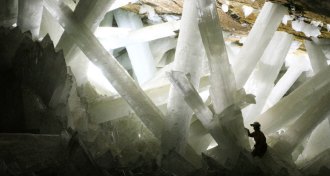 Microbes
MicrobesMicrobes survived inside giant cave crystals for up to 50,000 years
Microbes trapped in crystals in Mexico's Naica mine may represent some of the most distinct life-forms found in Earth so far.
-
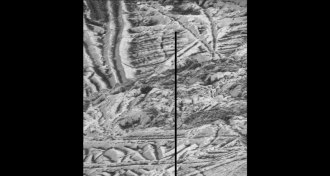 Planetary Science
Planetary ScienceEuropa lander mission takes another step toward reality
NASA is working on a possible lander mission in which the main science goal would be to search for signs of life on Jupiter’s moon Europa.
-
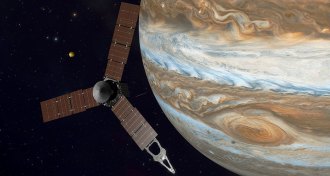 Planetary Science
Planetary ScienceJuno spacecraft won’t go into shorter orbit around Jupiter
Juno will remain in its 53-day orbit around Jupiter due to an issue with two helium check valves, NASA reports.
-
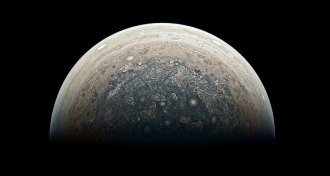 Astronomy
AstronomyCitizen scientists are providing stunning new views of Jupiter
A camera aboard NASA’s Juno spacecraft is giving citizen scientists a crack at discovering never-before-seen features of Jupiter.
-
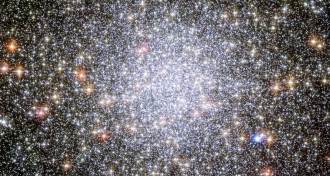 Astronomy
AstronomyMiddling black hole may be hiding in star cluster
A black hole with about 2,200 times the mass of the sun has been detected. If confirmed, it could represent a new type of gas-starved black holes and hint at how supermassive ones may form.
-
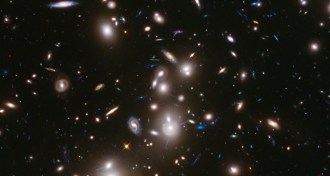 Astronomy
AstronomyFaint, distant galaxies may have driven early universe makeover
Gravitational lensing has revealed extremely faint galaxies in the early universe, suggesting these tiny galaxies were responsible for cosmic reionization.
-
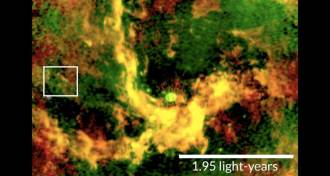 Astronomy
AstronomyConditions right for stars, planets near Milky Way’s supermassive black hole
Four clouds of gas near the galactic center have roughly the right mass to be young stars, possibly with planets.
-
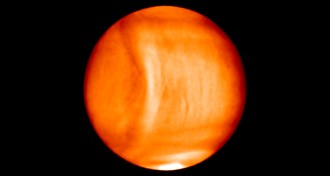 Planetary Science
Planetary ScienceWeird wave found in Venus’ wind-whipped atmosphere
A 10,000-kilometer-long gravity wave arched across the upper atmosphere of Venus. The feature may have been the largest of its kind in the solar system.
-
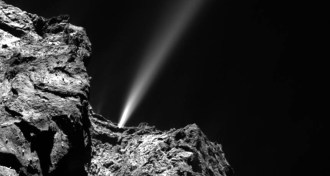 Planetary Science
Planetary ScienceComet 67P, Rosetta spacecraft cozy up to the sun
Comet 67P is shooting off brilliant jets of gas and dust as it swings in close to the sun, giving scientists clues to the space rocks chemical composition.
-
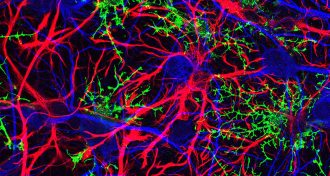 Neuroscience
NeuroscienceRethinking which cells are the conductors of learning and memory
Brain cells called glia may be center stage when it comes to learning and memory, recent research suggests.
-
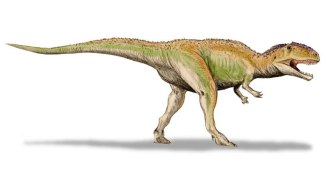 Paleontology
PaleontologyFossils illustrate evolution of life
Paleontologist Donald Prothero takes readers through the evolution of life on Earth from the earliest oozes of goo to our recent relative Lucy.
-
 Planetary Science
Planetary ScienceIce flows, haze offer more clues to Pluto’s geology
New Horizons’ latest data reveal more hints about Pluto’s shrinking atmosphere and possible underground ocean.